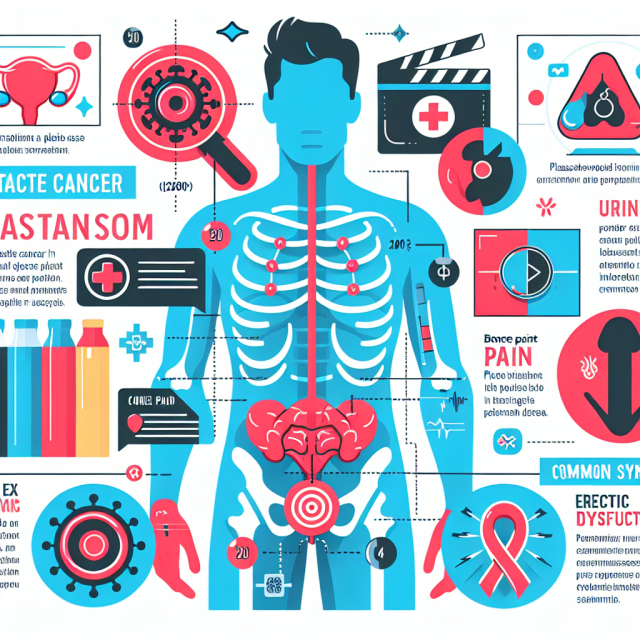
Prostate cancer is one of the most common cancers in men, yet it often goes unnoticed in its early stages. Knowing the signs of prostate cancer can make a significant difference in early diagnosis and treatment. This guide walks you through the symptoms, so you know what to watch for and when it’s important to see a doctor. Remember, you’re not alone on this journey—understanding the signs is the first step toward taking control.
What is Prostate Cancer?
Prostate cancer starts in the prostate gland, a small, walnut-shaped organ in men that produces seminal fluid. Cancer cells in the prostate can grow slowly or aggressively, depending on the type. Some forms of prostate cancer are manageable, while others need immediate attention, making it essential to recognize the symptoms early.
Why Recognizing the Signs Early Matters
Detecting prostate cancer early can make all the difference in treatment outcomes. Like spotting the first crack in a dam, addressing prostate cancer symptoms before they worsen can prevent a cascade of complications. Early diagnosis often means a wider range of treatment options and better chances for successful outcomes.
Common Symptoms of Prostate Cancer
The signs of prostate cancer can be subtle and are often mistaken for aging-related issues. Many symptoms are related to urinary health, but other signs can appear as the disease progresses. Understanding these symptoms helps you and your loved ones stay informed and proactive.
Urinary Symptoms: The Body’s Warning Signals
One of the earliest indicators of prostate cancer involves changes in urinary function, including:
- Frequent urge to urinate, especially at night
- Difficulty starting or stopping urination
- Weak or interrupted urine flow
These symptoms may seem mild but are worth discussing with a healthcare provider, as they can signal an underlying issue in the prostate.
Blood in Urine or Semen
Finding blood in your urine or semen can be frightening, but it’s an important symptom to take seriously. While there are many causes, blood in these fluids is often a red flag that warrants further examination, as it can indicate inflammation, infection, or even prostate cancer.
Erectile Dysfunction and Prostate Cancer
Erectile dysfunction (ED) is another symptom that can be associated with prostate cancer. While ED is common with age, if it suddenly appears without a clear cause, it’s worth getting checked. Sometimes, prostate cancer can impact nerve and blood vessel function, leading to sexual health issues.
Pain in the Lower Back or Pelvis
As prostate cancer grows, it can cause pain in areas around the pelvis, lower back, or hips. If this pain is persistent and not relieved by usual methods, it could indicate that the cancer has spread to surrounding tissues or bones, requiring immediate attention.
Unexpected Weight Loss
If weight starts to drop without changes in diet or physical activity, it could be an alarm bell. Weight loss in prostate cancer patients can result from metabolic changes, loss of appetite, or the body’s immune response to cancer. Noticing and addressing this symptom early on can help.
Changes in Bowel Habits
Bowel changes, while less common, can sometimes appear when prostate cancer spreads to nearby areas. Symptoms can include constipation or discomfort in the lower abdomen, highlighting the importance of paying attention to changes in routine bodily functions.
Risk Factors for Prostate Cancer
Knowing the risk factors for prostate cancer can also help in early detection:
- Age: Risk increases after age 50.
- Family history: Genetics play a role, especially with close relatives who have had prostate cancer.
- Race: Studies show that African American men are at a higher risk of developing aggressive prostate cancer.
When to Seek Medical Help
If you or a loved one experiences any of these symptoms, it’s best to seek medical guidance. Ignoring symptoms may feel easier at the moment, but early intervention is essential. Encourage open conversations about symptoms, especially in families with a history of prostate cancer.
Diagnostic Tests for Prostate Cancer
Prostate cancer is often diagnosed through tests such as a Prostate-Specific Antigen (PSA) blood test, digital rectal examination (DRE), and imaging scans like MRIs. These tests can confirm the presence of cancer, determine its type, and guide the next steps.
Early Detection and Treatment Options
Early-stage prostate cancer can often be managed with active surveillance, while advanced cases may require a combination of surgery, radiation, hormone therapy, or medications like abiraterone (Zytiga) and enzalutamide (Xtandi). Treatment options vary, making early detection valuable for better outcomes.
Supporting a Loved One with Prostate Cancer
If someone you know is navigating prostate cancer, your support is vital. Being present, listening without judgment, and offering practical help with daily tasks can make a big difference. Encouraging them to explore resources like HealingWell’s Community can provide additional comfort and information.
Conclusion
Understanding the signs of prostate cancer is crucial for early detection and effective treatment. By recognizing symptoms like changes in urinary habits, blood in urine, or unexpected weight loss, you can encourage loved ones to seek help early. Prostate cancer is manageable, especially when caught in time, making awareness the key to better health outcomes.
FAQs
1. Can prostate cancer be treated if caught early?
Yes, early-stage prostate cancer has many treatment options and a high success rate, especially with active surveillance or targeted therapies.
2. Is frequent urination always a sign of prostate cancer?
No, frequent urination can have various causes. However, it’s important to consult a doctor if this symptom appears suddenly or persists.
3. Does prostate cancer always cause pain?
Not necessarily. Early prostate cancer may not cause any pain, which is why regular screenings are important.
4. How is prostate cancer diagnosed?
Diagnosis typically involves a PSA blood test, digital rectal exam, and possibly imaging tests. A biopsy may confirm the diagnosis if necessary.
5. Are there lifestyle changes that can reduce prostate cancer risk?
Healthy diet, regular exercise, and avoiding smoking can support overall prostate health, though they may not prevent prostate cancer entirely.
For more articles on Prostate Cancer visit health.healingwell.com/index.php/category/health-conditions/prostate-cancer/




